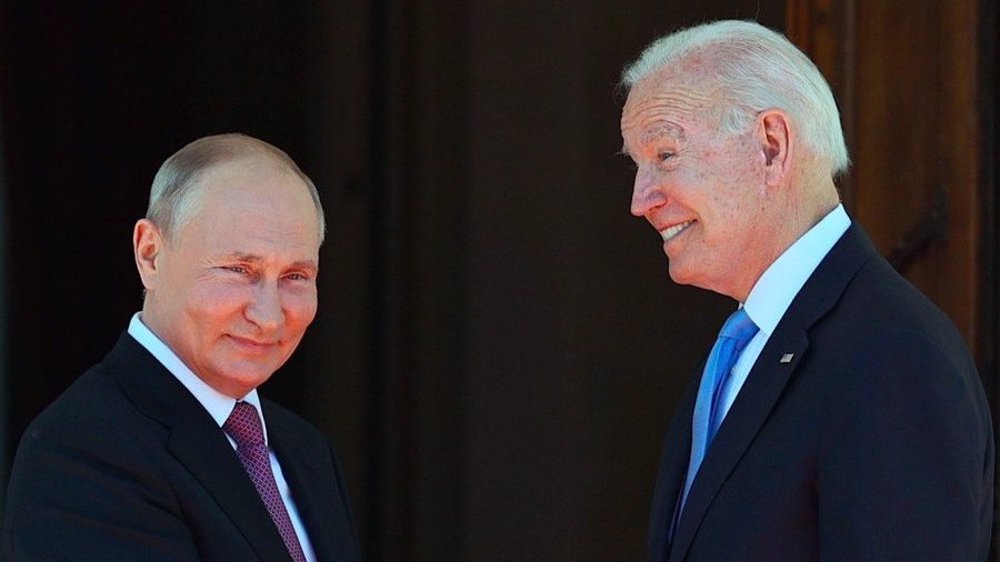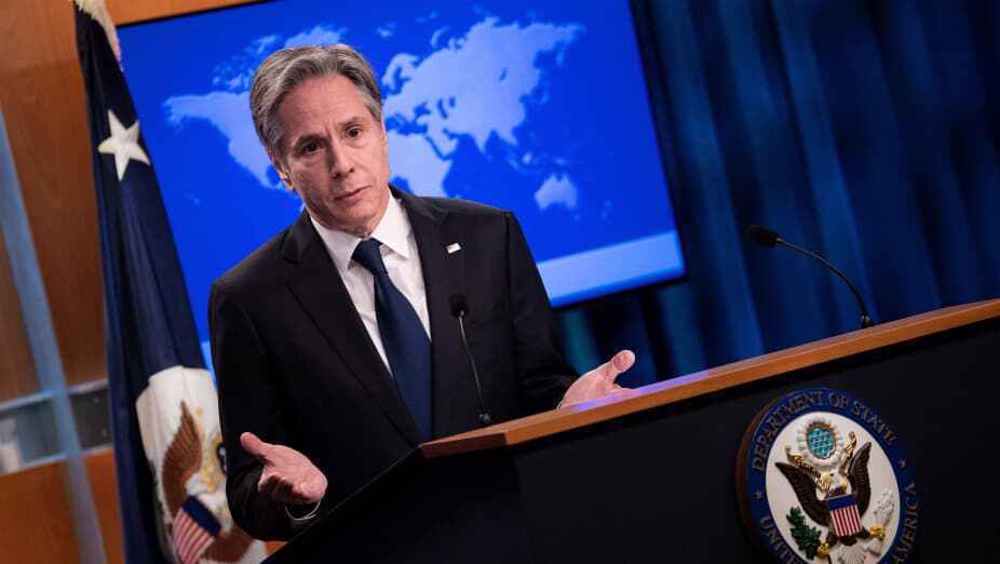Analyst: US possibly made compromises to Russia it doesn’t want to publicize
An American political analyst based in Moscow says the United States has possibly made certain compromises to Russia that it doesn’t feel comfortable publicizing.
Meanwhile others in the US - notably, the United National Antiwar Coalition (UNAC), The Black Alliance for Peace (BAP), ANSWER Coalition and CODEPINK - suggest that the policy itself of military brinksmanship over Ukraine is the result of Biden's "39% job approval rating, more deaths from COVID than during the Trump administration, and a failure to deliver on most of the promises made during the 2020 presidential campaign", resulting in what they called in a statement on January 27 "a clumsy attempt by the Biden administration and the Democratic Party to divert attention from the historic failures of the administration’s domestic policies."
According to BAP National Organizer, Ajamu Baraka: “The manufactured crisis with Russia over Ukraine demonstrates once again the incredible recklessness and outrageous opportunism that the U.S./NATO/EU Axis of domination is prepared to pursue in order to achieve its geostrategic objective of full-spectrum economic and political global domination.”
Nevertheless, after ratcheting up tensions with Russia, the United States now appears to be backing down. Washington on Wednesday delivered written replies to sweeping Russian security demands and sought dialogue over Ukraine.
US Secretary of State Antony Blinken announced that the US delivered on Wednesday the written response to Russian security demands that Moscow has called for.
Andrew Korybko, the Moscow-based American political commentator, said in an interview with Press TV on Thursday that “initial reports suggest that the US will not respect Russia’s security guarantees, though. It could be that this is just a ruse for the public.”
“Initial reports indicate that the US still doesn’t want to respect Russia’s red lines regarding the inadmissibility of Ukraine’s NATO membership, the deployment of strike weapons near Russia’s borders, and rolling back NATO’s military infrastructure to the pre-1997 status quo prior to the former Warsaw Pact countries’ membership in the bloc per the now-defunct Russia-NATO Founding Act from that same year,” he stated.
"Nevertheless, its continued diplomacy with Russia shows that there’s some sincere intent on the US’ side to at least listen to Moscow and consider perhaps reaching some series of pragmatic compromises aimed at de-escalating the crisis. To remind everyone, the crisis isn’t a Russian-Ukrainian territorial one but a Russian-US missile crisis. Russian intelligence suspects that the US is planning to deploy strike weapons – including hypersonic ones – to the region under the cover of ‘anti-missile systems’ using the pretext of ‘defending Ukraine’ if Kiev provokes the third round of civil war hostilities in Donbass,” he added.
Echos of past US provocations
Meanwhile, New York-based political commentator Don DeBar, pointing to the history of the so-called Cuban Missile crisis in 1962, said that, in fact, it was the placement of US nuclear missiles in Turkey by the Kennedy Administration in its first year that provoked a response from Moscow - the reciprocal placement of missiles in Cuba - which, in turn, nearly led to nuclear catastrophe.
In a January 2013 article in The Atlantic, former Soviet Premier Nikita Khrushchev was quoted as telling "a confidant that Kennedy had 'surrounded us with bases on all sides' and that missiles in Cuba would help to counter an 'intolerable provocation.'”
The article further reports: "In retirement, Khrushchev explained his reasoning to the American journalist Strobe Talbott: Americans 'would learn just what it feels like to have enemy missiles pointing at you; we’d be doing nothing more than giving them a little of their own medicine.'"
Moscow’s concerns
According to Korybko, “Moscow is concerned that such a move would undercut its nuclear second-strike capabilities, which could in turn place it in a position of nuclear blackmail that would then inevitably lead to a never-ending series of coerced unilateral concessions. That’s why Russia shared its security guarantee proposals in December and has been working very hard to reach a peaceful agreement with the US to avert that worst-case scenario. It’s unclear how this crisis will be resolved, but it’s also possible that the US makes certain compromises that it doesn’t feel comfortable publicizing'”.
A secret protocol?
Asked what is in the document that US Ambassador to Moscow John Sullivan handed over to the Kremlin on Wednesday, Korybko said, “It's too early to say exactly what’s in the documents unless credible sources share their contents or the gist thereof.”
“Initial reports suggest that the US will not respect Russia’s security guarantees, though. It could be that this is just a ruse for the public and it’ll actually enact certain compromises that it doesn’t feel comfortable publicizing, or that might actually be the truth. If the latter, then it remains to be seen how Russia will respond. It’s important to also mention that another round of the Normandy peace process is scheduled to take place sometime next month so diplomacy doesn’t seem doomed just yet,” he noted.
DeBar said, "In 1962, as the world teetered on the edge of nuclear war, the Kennedy Administration and the Kremlin fumbled their way to a secret deal that would remove both the missiles in Cuba and the missiles in Turkey, but that, for domestic political purposes, would only be respected by Kennedy if it remained secret. Any disclosure of a reciprocal deal would negate the whole thing."
"In other words," he added, "Kennedy was willing to risk yet again a nuclear war if he lost political face in the negotiations with Khrushchev."
Is a major war coming?
Korybko said, “It’s premature to speculate that a major war is coming. Even in the worst-case scenario of Russia’s security guarantees not being respected, Moscow can still respond in ways that don’t lead to full-fledged military action in Ukraine. These include deploying certain weapons systems in the region though within its own borders and striking imminent or hot threats in Ukraine using artillery or missiles without crossing the international frontier. If the US sanctions President Putin personally, Russia already said that this would be akin to breaking off formal relations between these two countries."
“That, however, isn’t the same as declaring war. It would just mean that diplomacy is doomed for the foreseeable future and that the US will likely rebalance its Eurasian containment efforts between Russia and China instead of focusing mostly on the latter like it could potentially do if it successfully de-escalates tensions with Moscow in Europe. Unprecedented sanctions against Russia would also inevitably harm the EU’s economy as well, which might not be resilient enough to deal with such a sudden shock considering its ongoing energy crisis,” he said.
“Wars do sometimes happen by miscalculation so that scenario can’t be comfortably dismissed, especially when discussing the involvement of Great Powers like Russia and the US in the current crisis. Even so, there doesn’t seem to be a desire on either’s side to enter into direct hostilities with the other. At the very worst, it’s most likely that Ukraine would be the scene of a heated proxy war between them, one that would reverberate all throughout Europe, mostly due to the economic consequences but also the humanitarian ones related to it triggering a large-scale refugee wave similar to the 2015 crisis,” he noted.
"It is worth remembering," DeBar said, "that while the real possibility of war with the Soviet Union was being discussed - and planned - Kennedy reportedly invoked a lesson drawn from a book that had been published months earlier, called 'The Guns of August.'"
That book, by Prof. Barbara W. Tuchman, analyzed the various ways that various nations had stumbled into the first world war "by miscalculation." Kennedy is reported to have said that it was the mistaken belief that each of the parties understood how the others would react that led to the inevitable result of war.
DeBar added, "This is so close to the existing dynamic that it practically is a textbook example of Mark Twain's observation that 'history may not repeat itself, but it certainly rhymes.' Unfortunately, as most of those Kennedy Administration insiders, as well as Fidel Castro and Khrushchev himself have reported, nuclear war was avoided only by an incredible amount of luck. If we are seeing the same scenario play out again, should we bet our survival as a civilization - perhaps as a species - on being lucky again?"
VIDEO | Press TV's news headlines
VIDEO | Israel steps up settlement expansion near Jenin
VIDEO | Iraqi resistance factions split over state control of weapons
Euro-Med: Israel using winter as weapon of genocide
Venezuela demands end to US military presence
Donors receive favors from Trump’s fundraising machine post-election: Report
VIDEO | Odds against peace in Ukraine?
Iran plans launch of its heaviest ever satellite on Dec 28











 This makes it easy to access the Press TV website
This makes it easy to access the Press TV website